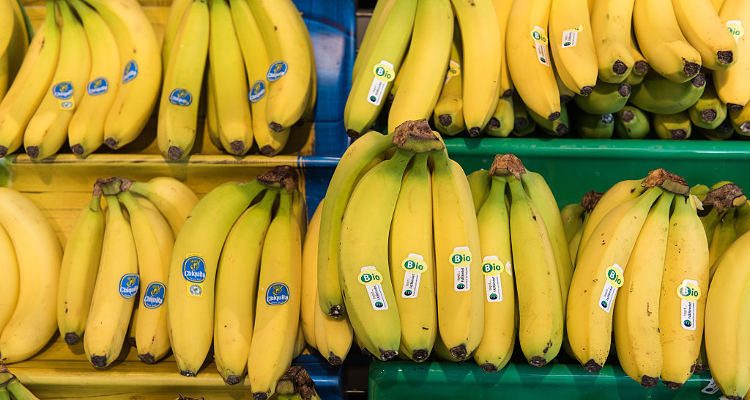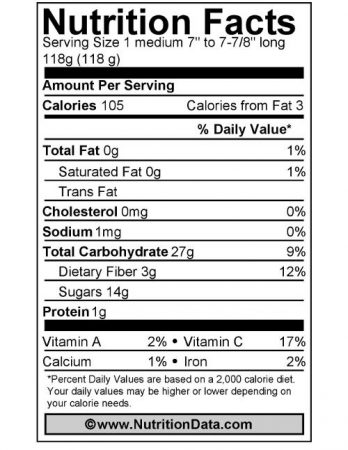
Bananas are the most popular and easily available fruit in the world. They are nutritious, with good amounts of dietary fiber, potassium, and antioxidants, along with many other vitamins and minerals. In addition to their great taste, bananas also offer a fair share of health benefits, including regulating bowel movements and helping with weight loss, since the fiber content provides a sense of fullness for a long time. However, eating too many bananas could have adverse effects on health.
Credit: Nutrition Data/Banana
To begin with, bananas are rather high in carbohydrate content—the majority of it is fiber, but the remaining carbs consist of sugars and starch. It is found that about 90% of the calories in bananas come from carbs, and as the fruit ripens, the starch in it turns into sugar. Therefore, consuming bananas beyond the moderate limit could have a flip side to losing weight—resulting in weight gain.
Bananas contain a good amount of potassium, and an excess of this mineral in the blood could lead to some adverse effects such as nausea, irregular heartbeat, and slowed pulse. Also, bananas contain tryptophan, an amino acid known to induce sleep and have a calming effect on the brain. Although, this is very good to revive your mood and relieve you of insomnia, eating too many bananas may induce sleep, even during the day.
Is Eating Too Many Bananas Bad for Your Health?
Yes, eating too many bananas could affect your health. From giving you allergies to making you constipated, when eaten in excess, bananas can cause some nasty health ailments. Therefore, as it goes with most foods, eating bananas in moderation is the key to good health. Here are some of the negative effects of eating too many bananas.
1. Constipation
Green bananas are rich in resistant starch, which doesn’t get digested as easily as most starches. So, eating too many green bananas cause constipation. The resistant starch absorbs water from the intestines. As a result, the stool hardens and bulks up, causing irritation in bowel movements and discomfort in defecation of toxic substances. On the other hand, ripe bananas are known to relieve constipation because they are rich in fiber. In fact, some studies show that they help rectify bowel movements. Green bananas have been traditionally used to treat diarrhea.
2. Latex allergy
Bananas have a (bad) reputation of causing latex allergies in some people. This is due to the presence of a protein which is quite similar to chitinase protein, which is found in latex. Antigens in people who are allergic to latex actually react with the chitinase protein. Therefore, consuming bananas can cause similar latex allergic reactions to latex-intolerant people. Other foods that also contain chitinase protein are kiwi, avocado, papaya, chestnut, tomato, potato and bell pepper.
3. Hyperkalemia
Bananas provide a good amount of potassium to the body, which is an essential electrolyte that ensures proper nerve and muscle functions. Therefore, eating too many bananas will inevitably increase the potassium level in the blood. And as we know, an excess of anything is unhealthy, the same is true in the case of potassium level as well. An excess amount of potassium in the blood will cause hyperkalemia, a lethal condition that dangerously alters the heart rhythm and disturbs the blood pressure level. However, this will not happen if you have 3 bananas a day. Furthermore, most nutritionists usually recommended eating a couple per day.
4. Nerve damage
Among all the vitamins, vitamin B6 content is highest in bananas with 21% dietary value in a medium-sized banana. Now, vitamin B6 is essential for maintaining healthy nerve and muscle functions. However, consuming too many bananas can lead to an excess influx of vitamin B6, pyridoxine, in the body. This can cause nerve irritation and mainly affect the smaller peripheral nerves of the hands and feet, causing numbness, painful tingling, and weakness in the “stocking-glove” distribution. One might also experience muscle spasms or cramps.
5. Headaches
Again, consuming too many bananas will provide the body with an unnecessary abundance of pyridoxine (vitamin B6) and this, in turn, can cause headaches with dull pain to throbbing and migraine-like pain. The pyridoxine toxicity may disturb the nerves around the head, leading to nasty headaches.
6. Drowsiness
Bananas are a tryptophan-rich food, which means that causes the brain to secrete serotonin. Now, serotonin is a stress-relieving hormone that induces good sleep. Hence, too many bananas can lead to drowsiness due to the excess amount of serotonin in the brain.
7. Weight gain
Bananas promote weight loss as they are highly rich in dietary fiber. But, on the other hand, they have a high sugar content. These natural sugars do not pose harm if you eat one banana a day. However, eating too many bananas will lead to an excess of these sugars, which may lead to weight gain.
According to SELF NutritionData website, a medium banana of seven to eight inches contains about 105 calories. A large banana of eight to nine inches contains about 121 calories. Most of the calories in a banana come from carbs including sugar and starch. Thus, eating too many bananas can lead to potential weight gain due to its calorie content.
8. Tooth decay
Bananas are inherently a sweet food. The sugar content in bananas is 12 grams per a 100-gram serving. As a result, a high-banana intake can erode the tooth enamel due to the sugar and acid content.
How Many Bananas Should You Eat per Day?
A simple fruit like the banana should also be eaten in moderation, and the recommended number is two bananas a day. Bananas have good nutritional values and are packed with dietary fiber, potassium, and antioxidants like vitamin C and selenium.
They also supply minerals like manganese, magnesium, and copper in good amounts that contribute to overall good health. Eat bananas for better bone health as they are rich in manganese. The mineral manganese ensures healthy bone structure, bone metabolism, and helps to create essential enzymes for building bones. Likewise, copper also helps the body in making the red blood cells and improving immunity, while magnesium regulates blood sugar levels, promotes normal blood pressure, and assist in protein synthesis in the body.
Bananas improve digestion due to the excellent dietary fiber presence. Bananas contain a good list of antioxidant elements like vitamin C, vitamin A, and selenium. They are known to benefit skin health as they are rich in vitamin C that helps in collagen synthesis. Selenium, another antioxidant that is known to inhibit cancer growth, is found in considerable amount in bananas. Thus, bananas may have cancer curing properties with impressive amounts of vitamin C and selenium.
Myth of Too Many Bananas Killing You
The myth that too many bananas can kill you is a theory with no medical cases to support it. It is a hypothesis that comes from the notion that bananas are potassium-rich and an excess of potassium has life-threatening effects. Bananas have potassium in abundance. A single banana contains about 422 milligrams of potassium, which is still harmless as the recommended daily allowance (RDA) of potassium for adults is about 4,700 milligrams per day. This means that an average adult can consume as many as 11 bananas in a day with intermittent intervals and still escape potassium toxicity. But if those many bananas are taken together at one go, then the sudden influx of potassium at a time can lead to probable hyperkalemia, resulting in fatal consequences.
Additionally, eating too many bananas can prove to be hazardous to individuals with chronic renal insufficiency. But this isn’t because potassium is innately dangerous, rather the unhealthy condition of the kidney is at fault. Potassium is excreted by the kidney, so people with kidney problems have difficulty in eliminating the superfluous potassium content and this leads to possible health hazards.
The recommended daily intake of banana per day is not more than two. It is found that six bananas can give you enough of a potassium level that is dangerous to health. Nutritionists and doctors believe that there must a balance in the potassium levels in our body, as it is a crucial mineral that regulates important functions of our body including heartbeat rhythm, blood pressure level, metabolism, and maintains healthy nerve and muscle functions.
In conclusion, we can sum up that bananas are a healthy food with mineral-rich nutritive values. They have been used as a home remedy to cure constipation for a long time, and the side effects of bananas can only arise from eating too many of them. Here, it is important to remember that bananas possess high levels of potassium, and therefore should be eaten in moderation to prevent potassium toxicity in the body.
Related:
- Eating Bananas Before Bed: Good or Bad?
- Are Bananas Fattening or Good for Weight Loss?
- How to Ripen Bananas Faster with These Simple Tricks
Sources:
“Eating Too Many Bananas,” Med-Health; http://www.med-health.net/Too-Many-Bananas.html, last accessed March 6, 2017
“Do bananas cause constipation,” Steady Health; http://ic.steadyhealth.com/do-bananas-cause-constipation, last accessed March 6, 2017
“How Many Bananas Should You Eat A Day?” New Health Advisor; http://www.newhealthadvisor.com/How-Many-Bananas-Should-You-Eat-A-Day.html, last accessed March 6, 2017
Arthurs, D., “How many bananas would you have to eat to kill you?” Metro, September 12, 2015; http://metro.co.uk/2015/09/12/how-many-bananas-would-you-have-to-eat-to-kill-you-5388867/, last accessed March 6, 2017
“Will Eating Too Many Bananas Kill You?” Snopes; http://www.snopes.com/food/warnings/bananapotassium.asp, last accessed March 6, 2017
“Do Bananas Cause or Relieve Constipation?” https://authoritynutrition.com/bananas-and-constipation/, last accessed March 7, 2017














